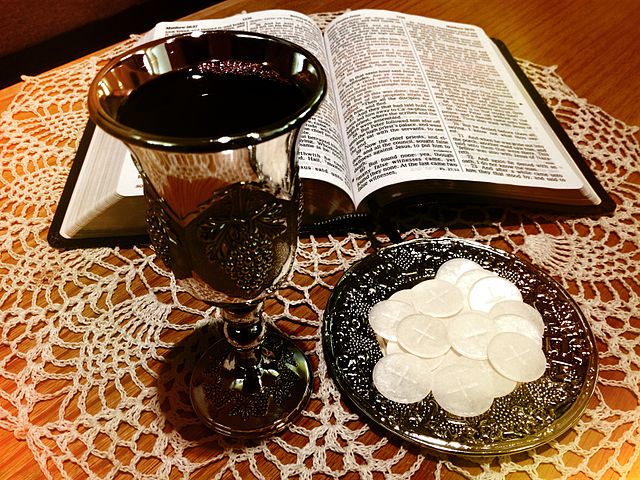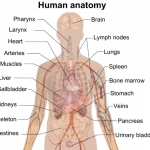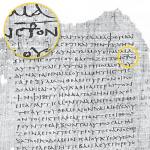Keeping our eyes fixed on the surface helps us see how the Supper contributes to a Christian understanding of culture. Bread and wine are, after all, cultural products. The Old Testament sacrificial system testifies to the link between cult and culture. Ancient Israelites never sacrificed raw materials. They brought roasted grain, flour, or bread, not raw grain; they didn’t offer newborn lambs or goats, but animals nurtured for at least a year. They didn’t pick up the materials for sacrifice from the neighborhood grocer. A shepherd brought a goat he had midwifed, fed, protected, led. A farmer planted and harvested grain and turned it into flour or bread suitable for the Lord’s table. God didn’t ask for his talent back; he wanted Israel to multiply talents. Israel’s tokens of liturgical exchange represented their labor. So do ours.
Given their liturgical preeminence in the church, bread and wine are representative cultural products that exemplify the telos of our labor. Work always transforms raw nature. Some transformations improve; some degrade. Bread is an elevation and glorification of grain. We remake the earth when we plow, cut grain from the stalk, pound grain into flour, knead dough, and fire up the oven to bake a loaf. To turn earth and seed into bread, we need to become like cherubim who wield sword and fire. Wine is a glorification of grapes, requiring analogous skills.
Fruits of earth and work of human hands, Eucharistic bread and wine are destined for shared festivity. Personal profit is good, but we don’t thrive if we eat and drink alone. Everything we make is a loaf, formed to be broken, distributed, shared. We work to meet practical needs but not only that. We build for beauty, cook for taste, shape stone, and smear paint to give visual pleasure. The Eucharist reminds us that we transform creation in order to make a delightful world more delightful.
Of course, this delight has a transcendent dimension. We eat and drink the products of our labor in the presence of God. The Father accepts us and our works in Christ, and the works of our hands, used in accord with God’s Word, become, by the Spirit, means of communion with Jesus. We discover that our works are ultimately his gifts to us, for which we offer thanks. As Schmemann emphasized, the Eucharist isn’t a strange exception to the normal pattern of work and culture. It unveils the deep truth of culture, that everything is a gift from our Father’s hand, a token of his love by which we enjoy continuous communion.
To bring vocation explicitly into it, the bread of Communion is more of the “daily bread” that God provides to us through the vocations of farmers, bakers, shopkeepers, etc., etc.*
In the Communion wafer, someone grew the wheat that someone ground into flour that someone baked into bread, with everyone in the division of labor and chain of production a “mask of God” who works through them to create this wafer. With daily bread, God feeds us physically. And with this particular daily bread, God feeds us spiritually, as Christ’s body is joined to this vocationally-produced object. This happens by Christ working through the vocation of the pastor, who consecrates the bread by the power of God’s Word.
So the human and the divine come together in the Sacrament in multiple ways. Here God gives us our bread, which He does every day, but in this sacred meal He also gives us His Son, the Bread of Life. He gives both by working through human beings, from the farmer to the pastor.
Leithart is emphasizing our work, which we offer to God. This is part of vocation, though strictly speaking we obey God by offering our work to our neighbors. But God is active even in our “secular” labors. He is present in the Sacrament but He is also present, though in a different way, in our secular callings.
How does wine fit into this?
*Keep in mind too, in the words of the Catechism, that “Daily bread includes everything that has to do with the support and needs of the body, such as food, drink, clothing, shoes, house, home, land, animals, money, goods, a devout husband or wife, devout children, devout workers, devout and faithful rulers, good government, good weather, peace, health, self-control, good reputation, good friends, faithful neighbors, and the like” (Lord’s Prayer, 4th Article).
Photo by John Snyder – Own work, CC BY-SA 3.0, https://commons.wikimedia.org/w/index.php?curid=30706095













